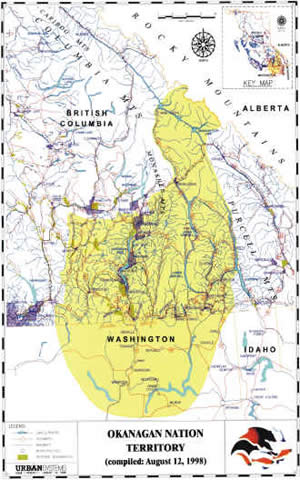By Emma Posluns
With information from Colleen Marchand, Manager Territorial Stewardship Division
 The Okanagan Indian Band (OKIB) is located on
The Okanagan Indian Band (OKIB) is located on
The office assistant first handles incoming referrals, who logs them into a database. Next, the database custodian creates a referrals file for the specific proponent. OKIB receives too many referrals to be able to respond to all of them; they get approximately 115 referrals a month. They only respond to those that have an immediate impact on the reserve, which are usually projects in the near vicinity of the reserve lands.
The database, which was made with the help of other First Nations, helps the referrals response process. The database uses Microsoft Access software and allows the referrals office to be organized and efficient. Four staff members, and occasionally a GIS Specialist make up the Territorial Stewardship department. Staff does all the tracking, administering, and communicating with referrals proponents. A committee completes the final stages of decision-making and then passes on recommendations to the Chief in Council.
The relationship between the OKIB and Revelstoke Community Forests (RCF) illustrates a successful referrals process. RCF wanted to use resources on traditional Okanagan Indian Band land. In order to complete the research required for the project, the two groups designed a service agreement to fund the research. Colleen Marchand, in charge of Referrals, jokingly admits that willing funders are always useful in a referrals response. While it is true that funding would make the process run more smoothly, it is also important to have cooperation and communication between the community and the proponent. By the end of this project, both groups could work together and benefit from the outcome of the relationship.

